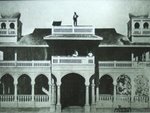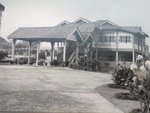The following article was written by Gavin Pao on 14 September 2007 and posted on Asia Sentinel, a news blog.
A short-term economic shock presages what happens when the oil runs out
Billboards and advertisements lining Brunei’s thoroughfares often implore their citizens to do something (or buy something) for the future generation. But, while most Bruneians have it quite easy, with free education and other heavily-subsidized services, the recurrent “future generation” theme implies a sense of apprehension.
On September 2, Brunei’s economy was reported to have shrunk by 3.6 percent during the first quarter of 2007 over the previous year. Oil and gas output plummeted by 9.4 percent during the period. Industry, agriculture, and fishing also contracted significantly, with the farm sector dropping 10.1 per cent in the first quarter, having shrunk 28.7 percent during the same period last year. Industrial output declined 8.6 percent from January to March this year, with mining, manufacturing, construction and electricity all posting downturns. Indeed, the only sector to record any growth during the first quarter was services, up 4.3 percent.
This is symptomatic of Brunei’s problems. The oil-rich sultanate’s attempts to diversify its economy to date have largely been based on encouraging the service sector. It has long promoted itself as a center for Islamic finance, and is making efforts to rejuvenate its tepid tourism sector. Special offers from Royal Brunei Airlines are often advertised abroad to provide a boost.
But oil has shaped every aspect of Bruneian life, from the 22-karat gold that coats the domes of the country’s biggest mosques, to the immaculately highways, reminiscent of Europe's best roads. The oil and gas sector accounts for roughly half of Brunei’s real GDP, and generates more than 90 percent of export earnings. And, as has been reported widely, Brunei’s crude deposits are running out. At the outside, they have perhaps 20 to 25 years left. Some estimates put the end of oil in Brunei in as little as seven to eight years.
Solely because it did not wish to share its massive oil wealth with the rest of Malaysia, Brunei refused to join the Federation of Malayan States when the British granted Malaysia independence in 1957. But it is clear that Brunei, with a native population of only 300,000-plus, must diversify its economy. It is an issue gaining increasing urgency.
Given Brunei’s relatively well-educated, cosmopolitan, English-speaking and largely urban population there is potential for service sector expansion. In late August, HSBC and Brunei Shell, the national oil company, teamed up to sponsor a youth business awards competition as part of an effort to spur entrepreneurial blood. It is one of scores of such competitions to try to shake Brunei’s young out of their torpor.
In addition, Brunei has embraced globalization the same way as other small, rich hubs like Hong Kong, Dubai, Singapore and Qatar, taking in large numbers of foreign workers to do lower-wage jobs.
Filipinos work behind café counters and in supermarkets, Indians dominate much of the city center. Nepali security guards are a common sight, and there has been a Gurkha camp here since the days of the British. The government can afford to pay for Australian and New Zealand natives to teach at university. Indeed, although Brunei abstained from joining Malaysia in the 1950s, it remained a British colony and protectorate until 1984.
The surface similarities between Brunei and other Asian hubs pretty much end there. Brunei has no hustle or bustle, no skyscrapers, little traffic or pollution, few factories, no bars (alcohol is forbidden), no legal nightlife. A large proportion of Bandar Seri Begawan’s 30,000 people live in clusters of traditional wooden villages, collectively called the Kampung Ayer, or water village, propped up on the riverbanks by wooden stilts and plank-ways.
These quaint dwellings do not represent poverty or backwardness, however. Rows of gleaming cars are permanently parked along the river banks, owned by those who live in the villages. Many locals choose to live a traditional and simple lifestyle, reflecting the innately conservative nature of Brunei’s social fabric.
This isn’t to say that Bruneians haven’t embraced a modern lifestyle. Most “traditional” dwellings come complete with satellite dishes. In coffee houses, teenagers surf the internet on palm-sized laptops. Women getting flying home from Singapore or Hong Kong often start out in sleek western clothing and change to shapeless Islamic garb in the airplane lavatories.
However, it could be argued that conservatism is an essential ingredient in maintaining a distinctly Bruneian identity. Adherence to strict Islamic codes of behavior is probably the most striking sociological difference between Brunei and Malaysia. Otherwise, the two speak identical Malay, albeit with differences in accent. Beef rendang and nasi ayam are both countries’ staple foods. Traditional lifestyle and national dress is similar, though not identical, especially in the case of the royal court.
Perhaps the second fundamental difference between Malaya and Brunei is the degree of reverence and extreme wealth accorded to the sultan. All royal ceremonies are conducted with much more attention to resplendence, opulence, and grandeur than in Malaysia.
A park right in the middle of the city center was built only to hold twice yearly celebrations, the country’s national day and the sultan’s birthday. It is otherwise always empty.
In newspapers, the front page article often begins with “His Royal Highness Prince Haji Al-Muhtadee Billah, the Crown Prince, did this, went there, launched that, met so and so, etc”. Portraits of the sultan and his wife are even more ubiquitous than in Thailand, where reverence for the king is fervent.
There have been recent reports of virulent criticism from imams about young women being indecently dressed. Such attention to traditionalism means it is unlikely that Brunei would ever consider being re-incorporated back into Malaysia, even should its oil revenues one day slump to the point that the government loses its original raison d'etre for independence?
“Never”, said Rizal, a 28 year-old teacher, who waved away the question. “We’re a steady and stable country, and there is no reason to expect that to ever change, one way or another”.
Indeed, Brunei may arguably have the least active political culture in Asia.
“We will never merge with Malaysia. Most importantly, we don’t want all the problems, social and otherwise, that afflict all modern countries, which thankfully we do not face; prostitution, bad family relations, degeneration, pollution, crime, drugs, corruption, deforestation.”
Brunei is also fiercely proud of its distinguished history. The kingdom of Brunei once controlled all of Borneo as well as a large chunk of what is now the Philippines. It repelled Spanish attempts to impose Christianity on its society, and instead acted as the main conduit for Islam in today’s southern Philippine provinces.
So how can the economy be given some extra life?
Importing yet more foreign labor to make up for the shortfalls in the farm and industrial sector is an option, however it is unlikely given the already large percentage of foreign workers in the country vis-à-vis the native population.
Indeed social fragmentation appears to be an issue of sorts. Bruneians express disdain towards the foreign minorities, and the groups are fairly segregated.
Although Brunei's options are relatively limited, there is still good reason to be optimistic. The IMF expects that capacity in the energy sector will be restored this year, and that the non-energy sector will record new growth given stable national macroeconomic foundations, as well as other sources of revenue directly and indirectly linked to energy.
It thus predicts that Brunei's economy will grow roughly 2.75 – 3 percent over the medium term, based on further development of downstream industries in the energy sector and other energy-related growth, as well as new government development projects.
Meanwhile, new opportunities to develop the tourism industry have yet to be taken advantage of. There is no reason why Brunei should not be able to compete with the likes of Sabah and Sarawak.
It has some of the world's best protected rainforest, with numerous national parks, and an impressive array of fauna, flora and wildlife. One of the country's national icons is the eccentric-looking proboscis monkey, a now-endangered animal with a huge protruding nose that gives it an almost clownishly human look.
It has first-rate museums and some of the most resplendent and awe-inspiring architecture in the region. Its food is excellent, and strict food quality control ensures consistent standards of hygiene and freshness.
But again, there may simply not be enough hands on deck to create a fully thriving tourist industry. Moreover, perceived exorbitant costs in Brunei continue to deter tourists of all shades.
But what deals the biggest blow to tourism is that it is the only country in Asia that bans the sale of alcohol. Nightclubs and discos are non-existent. Bali, the Indonesian tourist hot spot, is a classic example that outlines the importance of making exceptions to alcohol-related rules in order to keep the tourists streaming in. Don't expect Brunei to make any such compromises at the expense of its way of life.
However, travel in Brunei is inexpensive if one avoids the hotels, taxis and tour agencies. Government-funded youth hostels are better value than those in neighboring countries, and the food is cheap if you eat at the markets.
Bruneians are generally open, friendly and helpful to tourists, perhaps because there are so few of them, and partly because of Brunei's tranquility and laid-back attitude, coupled with the fact that shopping malls are just about the only entertainment.
Meanwhile, it looks like there are gradual changes taking place with regards to the way things are being run in Brunei. Take a recent trip to Jerudong Park Playground, the huge Disneyland-scale amusement park born from the excesses of the infamous Prince Jeffri, the sultan’s brother, and his Amedeo Development Corporation, once the largest non-petroleum conglomerate in the country, which collapsed in 1998 after it was revealed that it had suffered tens of billions of dollars in losses.
The park is free to all residents of Brunei and has a rather surreal air to it, with fun-for-the-family style rides and entertainment provided on a huge scale. Many of the rides and entertainment facilities had actually been temporarily closed and were making way for new attractions and other rides. And apparently, once these are finished, shock horror, people may even have to actually pay for some of them.
Welcome to my private journal generally on Brunei issues. Any opinions expressed are in my personal capacity. All rights to the articles are reserved.
Sunday, September 16, 2007
Subscribe to:
Post Comments (Atom)












No comments:
Post a Comment